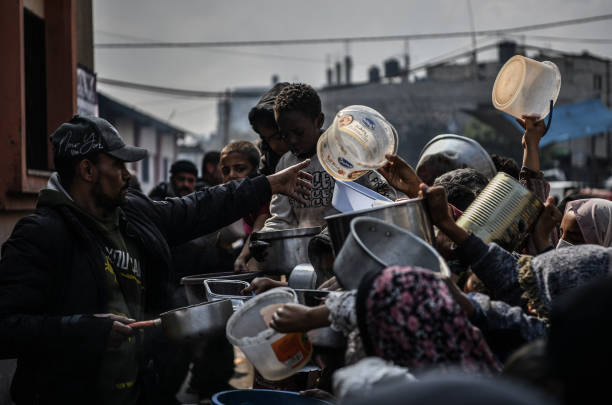The threat of famine in the Gaza Strip has resurged dramatically following Israel’s military operations in the southern city of Rafah. These actions have severely disrupted aid deliveries, pushing over 500,000 Palestinians to the brink of starvation. According to a recent analysis by the U.N.-backed Integrated Food Security Phase Classification (IPC), should the violence and constraints on humanitarian access persist, there is a “plausible” danger of famine in Gaza in the upcoming months.
The IPC report reveals a heartbreaking reality: over half of Gaza’s households are trading their clothing for food, a third are scavenging through trash to find items to sell, and more than 20 per cent of the population has endured entire days and nights without eating. Even before the current conflict, most Gazans were dependent on international aid due to the long-standing Israeli and Egyptian blockade that has crippled the enclave’s economy. Currently, over 500,000 Gazans experience “catastrophic levels of acute food insecurity,” according to the IPC, following eight months of conflict and many assistance deliveries being halted by Israeli security issues.
Table of Contents
Aid Disruption Worsens Conditions
The problem had been momentarily mitigated earlier in the year by enhanced relief supplies in March and April. However, things have deteriorated since the primary gateway for relief supplies was closed after Israel’s attack in Rafah. Kate Phillips-Barrasso, vice president of global policy and advocacy at Mercy Corps, expressed her concern, stating, “The fact that the entire population of Gaza is at emergency levels of hunger with over 500,000 people on the brink of starvation is no surprise. The Rafah offensive ground the relief response to a halt, thwarting the ability of humanitarian organisations to mitigate the suffering of 2.15 million people.”
The United Nations has issued warnings to Israel that its role as the principal provider of assistance inside Gaza is at risk unless the security situation improves for humanitarian workers. The increased risks for aid workers were brought to the attention of Muhannad Hadi, the U.N. officer managing relief in Gaza, in a letter dated June 17 and addressed to COGAT, the Israeli agency in charge of occupied territory. This sentiment was echoed by Sigrid Kaag, senior U.N. humanitarian coordinator for Gaza, in a subsequent meeting with Israeli Foreign Minister Israel Katz.
Call for Humanitarian Ceasefire
U.N. Secretary-General António Guterres’s spokesperson, Stéphane Dujarric, emphasized the growing dangers that aid workers in Gaza face. According to him, humanitarian efforts in Gaza have constantly been targeted as relief workers have been shot and killed, even in places that had previously been declared safe. The intolerable risks have claimed the lives of over 200 relief workers, 193 of whom were employees of UNRWA, the principal United Nations aid agency in Gaza.
The ongoing conflict, destroyed infrastructure, and shortages of vehicles and fuel further complicate aid delivery. Additionally, relief workers face threats from desperate civilians and criminal gangs attacking and looting aid distribution vehicles. While Israel asserts that it permits hundreds of trucks to enter southern Gaza daily, relief workers report that the security situation severely impedes effective distribution.
Dujarric emphasised the urgent need for a humanitarian ceasefire, calling for the immediate and unconditional release of all hostages. The civilian toll continues to rise, with at least 37 Palestinians, including children, killed in Israeli airstrikes on Tuesday. The Israeli Defense Forces (IDF) claimed the targeted building was used by “Hamas terrorists,” although international law classifies the relatives of combatants as civilians unless they actively participate in hostilities.
Seeking a Path Forward
The Israeli government, led by Prime Minister Benjamin Netanyahu, aims to defeat Hamas but has yet to present a clear post-war plan for Gaza. Israel’s National Security Council head, Tzachi Hanegbi, acknowledged the need for a moderate and pragmatic alternative to Hamas, one that is locally led and backed by Arab and other countries. However, Netanyahu has already rejected a post-war role for the Palestinian Authority, despite suggestions from international allies like the United States.
Diplomatic efforts are also underway to prevent a broader regional conflict. U.S. Defense Secretary Lloyd Austin highlighted the provocations by Hezbollah, warning that they could escalate into a regional war. He emphasised that diplomacy is the best way to prevent further escalation and ensure the safety of Israeli and Lebanese citizens.
As Gaza teeters on the brink of famine and the humanitarian crisis deepens, the international community faces mounting pressure to find a sustainable resolution to the conflict and ensure the continuous flow of aid to the besieged population.
